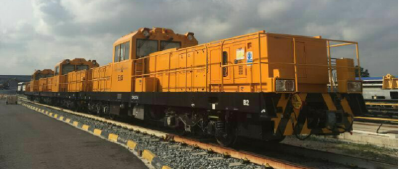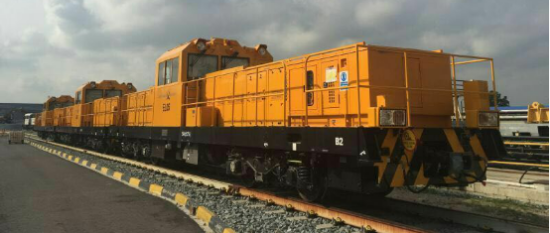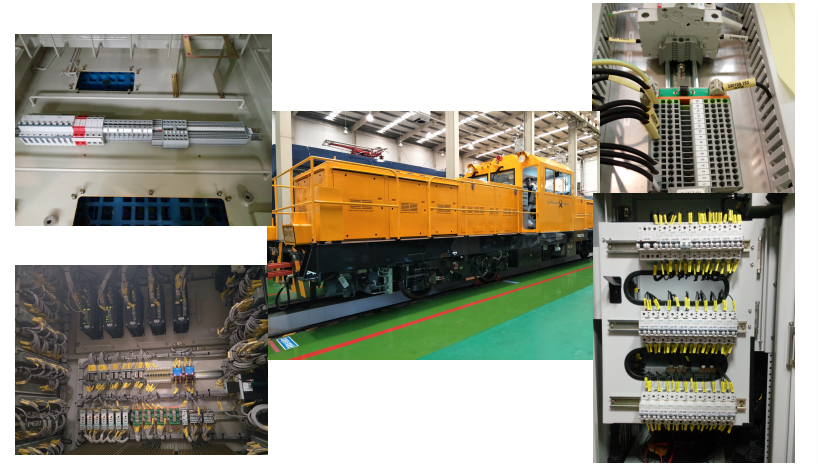Changsha office 0731-88922097
Zhuzhou office 0731-22867780
DETAILSPAGEProduct CenterTechnical SolutionProject Case |
Particulars
ZER1 Singapore C1677 battery power engineering vehicle is a dual-supply electric engineering vehicle powered by the third rail or vehicle traction battery. It actively implements the national energy conservation and emission reduction strategy, and leads the market to develop new industries with environmentally friendly green low carbon technology. It is China. A brand new product for rail transit. The project adopts the overall layout of the double-outer corridor of the middle single driver's cab. It is the first four-axis engineering vehicle in China that uses the multi-supply hybrid power supply system of the contact net/third rail, traction battery and diesel generator. In the electric area, the contact network/third rail is used for power supply, and in the non-electric area, the vehicle battery is used for power supply, and the braking energy can be fed back to the vehicle battery. Suitable for seamless traction conversion with and without electrical zones. It has the technical advantages of environmental protection, energy saving, low noise and zero emission. This model closely grasps the technical particularity of battery electric engineering vehicles, focusing on the system integration technology of battery electric engineering vehicles, the main transmission technology of dual power supply, network communication and control technology, braking technology, and the establishment of battery electric engineering vehicles. The technology development platform has enabled China to master the technology of pure electric rail engineering vehicles in one fell swoop, which has caused widespread repercussions in the world. Its overall technology has reached the international advanced level. The CRRC Zhongzhu machine was exported to Singapore in 2013, which broke the monopoly of foreign technology and was highly recognized by the owners and was a milestone. The project has been mass-produced to 32 units so far. Development process Project launch in October 2011 Passed the electric drive system program review in February 2012 Adopted the overall technical program review in May 2012 The first car in October 2012 Complete vehicle type test from January to April 2013 Delivered to the Singapore project site on August 20, 2013 to deliver the owne Key technical parameters The hook of the engineering vehicle is the same as the urban rail vehicle, and the coupler type can meet the needs of users. The air brake system uses the DK-II type electric air brake. The engineering vehicle adopts a dual power supply system, and the flow receiving device is a third rail current collector. The engineering vehicle adopts a direct-AC electric drive system, and generates four asynchronous traction motors by generating three-phase AC power through a VVVF inverter composed of high-power IGBT modules. The electric brake adopts regenerative braking and resistance braking, which can reuse the energy of the engineering vehicle when braking, and is energy efficient. The engineering vehicle has a vehicle traction battery charger, which can charge the vehicle battery while running, saving charging waiting time. The engineering vehicle and the same type of engineering vehicle can be linked and grouped to realize reconnection control. The key components of the engineering vehicle's current receiving device, traction battery pack, traction converter, traction motor, and bogie are all mature, reliable and application-oriented components, with good maintainability and high reliability. Our product advantages: Operating temperature range -40 to +70 °C According to the standard: IEC60571, IEC60077 (GB21413), EN50155, etc. Anti-vibration and shock resistance Meets the vibration and shock resistance requirements of EN50155, IEC61373; Cage spring clamping technology ensures that the product is reliably connected under vibration conditions. Low smoke, halogen free, flame retardant Meets EN45545 (HL1 ~ HL3) fire protection standards Wide voltage range: Control voltage range from 0.7 to 1.25Us, integrated surge suppressor According to the standard: IEC60571, IEC60077 (GB21413), EN50155, etc.
|




